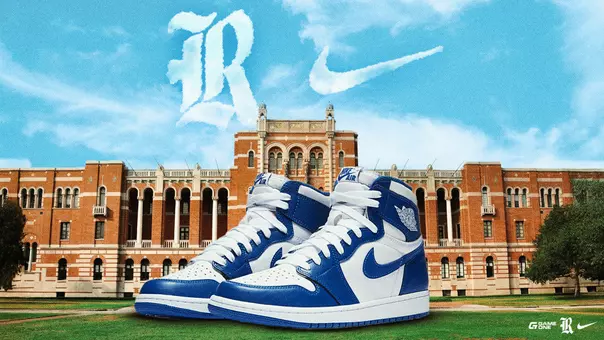Sam Waugh's Eulogy for J Fred Duckett
7/26/2007 12:00:00 AM | General
July 26, 2007
Editor's Note: The following are the prepared remarks delivered by Sam Waugh, an administrator and coach at the Awty International School, during the memorial service for J Fred Duckett at Autry Court. Special thanks to Alan Shelby and Martin Kaplan for their assistance in obtaining the full text
I suspect that many of you here today - like me - heard J Fred Duckett long before you actually met him. My introduction came in September of 1973 when as a Rice University Freshman I attended my first home football game, only to be entertained by the stentorian voice of Rice athletics rumbling over the then somewhat inadequate p.a. system. I didn't know it then, but it was a voice I was to hear regularly for the next 34 years.
I actually met the man behind the voice that same year at the Rice track during fall workouts, and it was then that I began my introduction to this champion of intense passions, one of which happened to be track and field. Disembodied voices force us to form impressions as to the appearance and character of the unknown speaker, and inevitably many of those impressions later prove ill-founded, but such was not the case with J Fred. He delivered on the promise of that voice.
Here was a big man, authoritative and accomplished. Ironically though, precisely because of that voice and his impressive size and physical presence, I think he has often been misjudged as someone who was a simple and easy read, the quintessential, one dimensional, jovial big man. Aspects of his personality were indeed cartoonish, but his size, his laugh, his appetite, and his booming voice masked a far more complex individual whose very nature is best defined by contradictions.
He was born in Houston and, with the exception of the time he spent in Austin earning his Master's Degree and one year he spent in Holland, he never left, never even moved more than a mile or two from where he was born on South Blvd to where he died in Methodist Hospital. Poe Elementary School, Lanier Jr High, Lamar High School, and Rice University are near neighbors and his home in West University is just down the street, but this deceptively parochial pattern masks his surprisingly international perspective.
He spent several summers chaperoning student tours of Europe; he married first a German and then a Dutch woman; he and Baudine served for years as host parents to a series of Rice's international graduate students; and he spent the last 17 years teaching kids from all over the world at the Awty International school. This 5th generation Texan appreciated the larger world beyond our borders.
Devotion to athletics usually connotes a relative neglect of academic pursuits, but here again J Fred defied convention. True, football and track consumed him as a participant from Jr High through Rice, and he played basketball (poorly he claimed) on Lamar's 1951 State Championship team. Post collegiately he gave up active sports participation yet channeled his athletic passion into officiating and coaching high school football and track. And of course, since his junior year at Rice, he was always announcing.
But despite this intense immersion in all things athletic, J Fred remained a genuine intellect. At Lamar he was a national level debater (no surprise there I suppose) and an Eagle Scout; at Rice he edited the student newspaper, the yearbook, sang in the glee club, served on the Honor Council, and then earned his Fulbright Scholarship. He prided himself on his ballroom dancing. He spoke German and Dutch and loved the opera.
He taught his 10th grade history course at Awty from a text he wrote himself. He possessed an exhaustive knowledge of the Civil War, though at times I found him to be a little bit hazy as to how that one finally turned out. In short, he could regale you with tales of Napoleon just as easily as he could recount the Jess Neely years of Rice football. Academics and athletics shared equally in his world.
As you might imagine, J Fred's opinion of the value and accessibility of technology generally ranged from mild frustration to ranting profanity, yet again even here he demonstrated a contradiction. He hated cell phones; they were the bane of his existence because some idiot had designed the keys too damn small. (I think that's a direct quote). You could not leave him messages because he never bothered to set up his voice mail - too complicated. He harbored a fundamental mistrust for micro wave ovens. How could you cook something without heat?
Until recently, he typed all his History tests on an electric type writer and then zeroxed them because printers jammed and ran out of ink. But despite this techno-phobia, he instantly latched on to email as it allowed him to communicate, and that he truly valued. In fact, I consider him the pioneer, the inventor, of all those sites where people set up personal pages and then claim virtual friends - Friendster, My Space, Face Book - except his hundreds of friends really exist. No one was more diligent about maintaining contact with people than he. So he became the maestro of email.
J Fred's Houston forced an environment on him against which he struggled all his life. He grew up in segregated Texas and attended segregated Schools all the way through his Master's. All athletic events then were strictly separated on the regional level, and Texas had two sets of State Championships in every sport- one for blacks and one for whites. But when the Houston Independent School District finally relented in 1967,
J Fred proudly became a member of the first integrated officiating crew calling those first tense football games. Athletics taught him the reality of equality and transformed his life, and this product of the old South learned a new perspective.
J Fred told me once on one of our many forays to Otto's for a burger - no cheese, no onions, extra tomatoes, thank you mam- or thank you bub if the cashier happened to be a man- that he made three really smart decisions in his life, and they determined his happiness :
The first of those crucial decisions was to attend Rice. J Fred's father was an Aggie, but with the Korean war brewing in 1951, J Fred thought it best to avoid mandatory military service which was then required of all A&M students. A&M was also all male at the time, and you can be sure that that prospect did not much appeal to the 18 year old J Fred either. So Rice it was, and he has been fiercely loyal and dedicated to the institution ever since. Rice set him on his academic course and launched his announcing career. That aspect of his life more than anything else, he recognized, established his legacy.
He announced Rice events for over 50 years including the Conference USA Track Championships just last month, but over the years he also announced the Astros where he famously made Jose Cruuuuz his signature, the Oilers, the Rockets, 2 professional soccer teams, a hockey team, the Texas Relays, the Kansas Relays, 3 NCAA national track and Field meets, the Junior Olympics, the Olympic Festival, the Houston Marathon, 10,000 assorted track meets and the Bobby Riggs vs. Billie Jean King battle of the sexes tennis match held in the Dome.
Somewhere in all of this activity, Track and field emerged as J Fred's area of greatest focus and expertise. If you have ever run in a track meet in Texas you understand the impact he has had on the sport through his announcing career. Track is a poor step child in the athletic pantheon, excepting the Olympics every 4 years - 3 of which J Fred officiated by the way, as meets take too long and do not generate revenue. It is a sport best left to the aficionados. But J Fred approached every meet and every competitor as if it were the Olympics and he or she were potential Olympians.
He kept a notebook all season long in which he recorded names and results for high school and college athletes; hence, when he announced the third heat of the girl's 800 he magically had background on each runner, and he would include these in his introductions, in the process making every athlete feel like they mattered. Jon Warren who coaches the men's team at Rice remembers in high school that J Fred's mere presence added gravitas to any meet, regardless of its actual import.
In the arcane world of track and field that is gold, and he will be forever revered for his dedication to and encyclopedic knowledge of the sport. Simply, in Texas, J Fred is Track, and there is no else like him.
J Fred's second great decision was to marry Baudine after once letting her get away from him because he thought he was not ready for marriage. Baudine brought him his daughter Petra and Petra brought him her husband Sean and together they brought him Anna, his grand daughter; they have been a great source of solace to him over the past few difficult months. A medical doctor would dispassionately tell us that the leukemia which eventually ended J Fred's life is strictly a medical condition caused by abnormal cells and body chemistry, but in my heart I know better. I am convinced that Baudine's death in January directly altered his health. She meant the world to him, and he was lost without her.
J Fred's 3rd key decision was the one to return to teaching at the Awty International School after having left the profession in the early 60s to make more money. Right after graduate school he taught and coached at St. John's School, loved what he was doing, but hated the financial reality. He left eventually to sell insurance.
In 1990, I ran into J Fred at the Rice track as I often did over the years, asked routinely how he was doing, and he told me he hated his job. On a whim I mentioned that I had a part time History opening at Awty assuming naturally that he could not afford to take it. Instead, he jumped at the opportunity and has been ensconced at the School ever since, running the Student Council, teaching History, coaching the throwers, and of course announcing Awty events.
At 74, he loved coming to work every day, and if anyone was ever suited for the mentoring, school master role, it is J Fred. He attended every drama production, concert, athletic event, and dance that we put on, and rather than me having to solicit his support as I do with most faculty, he went because he enjoyed it all. And I defy you to find anyone who could fill the role of Santa Claus better than he did.
Each December the School holds a tree lighting ceremony to inaugurate the holiday season, the highlight of which to the Elementary Schoolers (and I suspect to most of the rest of us as well) is the arrival of Santa, on cue, as we all sing "Santa Claus is Coming to Town". Picture your 6 year old self sitting on the gym floor when from the curtains, stage left, emerges in full red velvet and white bearded Santa regalia, a 6'4" inch tall, 360 pound giant roaring HO, HO HO in a basso profundo voice. Now that really is Santa Claus, by God, right there in the flesh, and J Fred transported those kids to another dimension. It was a role he absolutely relished, and it epitomized his genuine spirit, a spirit which partially explains why he is so beloved in our community.
What does it tell you about a 74 year old man who delights in playing Santa Claus? Maybe everything you need to know. He repeatedly told me he should never have left teaching, the money be damned, as no other profession allowed him to be him nor combined the academic and the athletic, the two dominant strands of his life.
We humans are all flawed creatures and certainly J Fred was no different. He was so stubborn that eventually I quit assigning fellow teachers to share a room with him because he just wouldn't leave when it was their turn to teach in his space. And despite my best efforts I couldn't get him to stop openly uttering the occasional vulgarity when he suffered a fit of pique, but students seemed less concerned about this than I was. Flaws like these, of course, pale in the face of his profound humanity. He knew everyone in Houston, and they knew him. I can tell you personally that the zeal with which he attacked a large chocolate malt alone was enough to restore my faith in the fundamental goodness of life.
I encourage all of you to Google J Fred Duckett when you get home this afternoon just to get an idea of what he has meant to so many diverse people. It will be a humbling experience, I assure you, when you realize the extent of the impact one individual can have.
I stumbled across a quote a while ago somewhere, which I have always liked. It said something to the effect that the true wealth of a man can be counted, not by money or material goods, but by the number of friends one makes in a lifetime, (look around the room) and by that measure J Fred Duckett was the richest man I've ever known; I am confident that I speak for all of you when I say I feel privileged to have had him consider me one of them. I am going to miss him dearly but a day won't go by that I won't think of him.
Finally I would like to thank Jim Bevans and Rice and all the guests - J Fred loved nothing more than an audience and you can be sure he would have been overwhelmed and honored by your show of support and respect.





